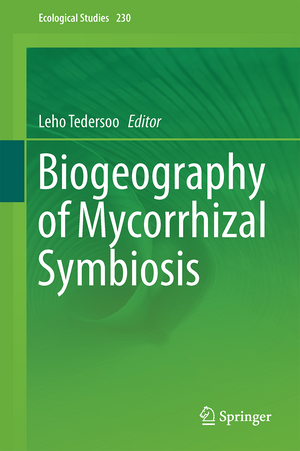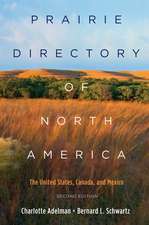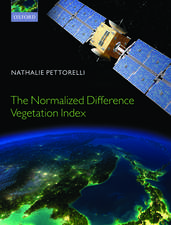Biogeography of Mycorrhizal Symbiosis: Ecological Studies, cartea 230
Editat de Leho Tedersooen Limba Engleză Hardback – 15 iun 2017
| Toate formatele și edițiile | Preț | Express |
|---|---|---|
| Paperback (1) | 1461.79 lei 39-44 zile | |
| Springer International Publishing – 13 mai 2018 | 1461.79 lei 39-44 zile | |
| Hardback (1) | 1479.58 lei 39-44 zile | |
| Springer International Publishing – 15 iun 2017 | 1479.58 lei 39-44 zile |
Din seria Ecological Studies
- 18%
 Preț: 1118.93 lei
Preț: 1118.93 lei -
 Preț: 553.71 lei
Preț: 553.71 lei - 18%
 Preț: 1680.55 lei
Preț: 1680.55 lei - 18%
 Preț: 1003.38 lei
Preț: 1003.38 lei - 20%
 Preț: 1004.69 lei
Preț: 1004.69 lei -
 Preț: 480.62 lei
Preț: 480.62 lei - 5%
 Preț: 752.26 lei
Preț: 752.26 lei - 15%
 Preț: 643.99 lei
Preț: 643.99 lei - 15%
 Preț: 644.18 lei
Preț: 644.18 lei - 15%
 Preț: 652.49 lei
Preț: 652.49 lei - 18%
 Preț: 789.83 lei
Preț: 789.83 lei -
 Preț: 382.36 lei
Preț: 382.36 lei - 15%
 Preț: 643.48 lei
Preț: 643.48 lei - 15%
 Preț: 646.30 lei
Preț: 646.30 lei - 15%
 Preț: 634.32 lei
Preț: 634.32 lei -
 Preț: 384.86 lei
Preț: 384.86 lei - 18%
 Preț: 789.98 lei
Preț: 789.98 lei - 15%
 Preț: 645.14 lei
Preț: 645.14 lei - 15%
 Preț: 649.39 lei
Preț: 649.39 lei - 18%
 Preț: 1005.43 lei
Preț: 1005.43 lei - 18%
 Preț: 949.23 lei
Preț: 949.23 lei - 15%
 Preț: 649.54 lei
Preț: 649.54 lei - 15%
 Preț: 643.34 lei
Preț: 643.34 lei - 15%
 Preț: 649.71 lei
Preț: 649.71 lei - 15%
 Preț: 638.76 lei
Preț: 638.76 lei - 18%
 Preț: 957.62 lei
Preț: 957.62 lei - 18%
 Preț: 1235.25 lei
Preț: 1235.25 lei - 18%
 Preț: 962.18 lei
Preț: 962.18 lei - 18%
 Preț: 949.23 lei
Preț: 949.23 lei - 15%
 Preț: 660.68 lei
Preț: 660.68 lei -
 Preț: 397.76 lei
Preț: 397.76 lei - 15%
 Preț: 638.24 lei
Preț: 638.24 lei - 18%
 Preț: 942.31 lei
Preț: 942.31 lei - 18%
 Preț: 1232.57 lei
Preț: 1232.57 lei - 15%
 Preț: 651.34 lei
Preț: 651.34 lei - 18%
 Preț: 952.72 lei
Preț: 952.72 lei - 18%
 Preț: 1834.27 lei
Preț: 1834.27 lei - 18%
 Preț: 1229.10 lei
Preț: 1229.10 lei -
 Preț: 423.95 lei
Preț: 423.95 lei - 18%
 Preț: 948.92 lei
Preț: 948.92 lei
Preț: 1479.58 lei
Preț vechi: 1946.81 lei
-24% Nou
Puncte Express: 2219
Preț estimativ în valută:
283.12€ • 296.20$ • 235.19£
283.12€ • 296.20$ • 235.19£
Carte tipărită la comandă
Livrare economică 31 martie-05 aprilie
Preluare comenzi: 021 569.72.76
Specificații
ISBN-13: 9783319563626
ISBN-10: 3319563629
Pagini: 566
Ilustrații: X, 566 p. 62 illus., 43 illus. in color.
Dimensiuni: 155 x 235 mm
Greutate: 1.09 kg
Ediția:1st ed. 2017
Editura: Springer International Publishing
Colecția Springer
Seria Ecological Studies
Locul publicării:Cham, Switzerland
ISBN-10: 3319563629
Pagini: 566
Ilustrații: X, 566 p. 62 illus., 43 illus. in color.
Dimensiuni: 155 x 235 mm
Greutate: 1.09 kg
Ediția:1st ed. 2017
Editura: Springer International Publishing
Colecția Springer
Seria Ecological Studies
Locul publicării:Cham, Switzerland
Cuprins
Overview of phylogenetic approaches to mycorrhizal biogeography, diversity and evolution.- Population Biology and Ecology of Ectomycorrhizal Fungi.- Spore dispersal in ectomycorrhizal fungi at fine and regional scales.- Processes maintaining the co-existence of ectomycorrhizal fungi at a fine spatial scale.- Altitudinal gradients in mycorrhizal symbioses: The current state of knowledge on how richness and community structure change with elevation.- Ectomycorrhizal fungal lineages: detection of four new groups and notes on consistent recognition of ectomycorrhizal taxa in high-throughput sequencing studies.- The predictive power of ecological niche modeling for global arbuscular mycorrhizal fungal biogeography.- Biogeography of orchid mycorrhizas .- Biogeography of ericoid mycorrhiza.- Biogeography of root-associated fungal endophytes.- Global patters of mycorrhizal distribution, and their environmental drivers.- Biogeography and ecology of Tulasnellaceae.- Biogeography of the ectomycorrhizal mushroom genus Laccaria.- Progress and challenges in understanding the biology, diversity, and biogeography of Cenococcum geophilum.- Biogeography of the Japanese gourmet fungus, Tricholoma matsutake: a review of the distribution and functional ecology of matsutake.- Biogeography and specificity of ectomycorrhizal fungi of Coccoloba uvifera.- Distribution and evolution of mycorrhiza types and other specialised roots in Australia.- Global patterns in local and dark diversity, species pool size and community completeness in ectomycorrhizal fungi.- Evolution of ectomycorrhizal symbiosis in plants.- Global biogeography and invasions of ectomycorrhizal plants: past, present and future. Global diversity and importance of mycorrhizal and nonmycorrhizal plants.
Recenzii
“This is a timely and comprehensive overview of a key topic rarely addressed in treatises on mycorrhizal associations … . I found this a most insightful, stimulating, well-edited, and even exciting work. The editor is to be congratulated on having had the vision and energy necessary to bring it to completion.” (IMA Fungus, Vol. 8 (02), December, 2017)
Notă biografică
Leho Tedersoo
University of Tartu
Tartu, Estonia
email: leho.tedersoo@ut.ee
University of Tartu
Tartu, Estonia
email: leho.tedersoo@ut.ee
Textul de pe ultima copertă
This book offers a timely overview and synthesis of biogeographic patterns of plants and fungi and their mycorrhizal associations across geographic scales. Written by leading experts in the field, it provides an updated definition of mycorrhizal types and establishes the best practices of modern biogeographic analyses. Individual chapters address the basic processes and mechanisms driving community ecology, population biology and dispersal in mycorrhizal fungi, which differ greatly from these of prokaryotes, plants and animals. Other chapters review the state-of-the-art knowledge about the distribution, ecology and biogeography of all mycorrhizal types and the most important fungal groups involved in mycorrhizal symbiosis. The book argues that molecular methods have revolutionized our understanding of the ecology and biogeography of mycorrhizal symbiosis and that rapidly evolving high-throughput identification and genomics tools will provide unprecedented information about the structure and functioning of mycorrhizal symbiosis on a global scale. This volume appeals to scientists in the fields of plant and fungal ecology and biogeography.
Caracteristici
Provides new insights into plant and fungal ecology and biogeography Describes best practices and novel methods in biogeographic and phylogeographic studies Sets standards for the overall definition and interpretation of mycorrhizal symbiosis in plants Includes supplementary material: sn.pub/extras












